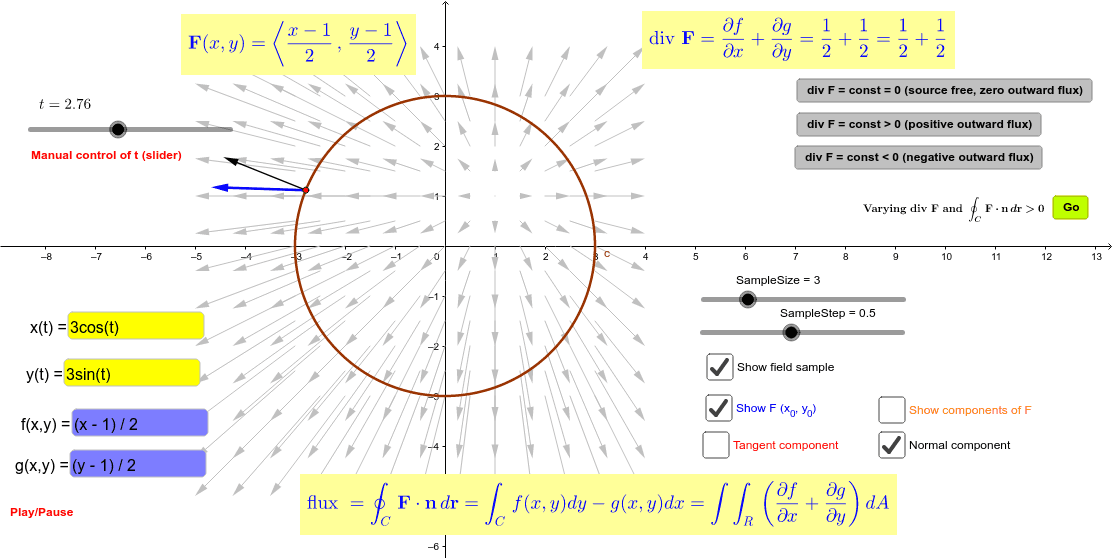Flux Form Of Green S Theorem
Flux Form Of Green S Theorem - We substitute l(f) in place of f in equation (2) and use the. The flux of a fluid. The integral we would normally use to calculate the area is just \iint_r 1\,da ∬ r1da. The flux form of green’s theorem relates a double integral over region \(d\) to the flux across boundary \(c\). In a similar way, the flux form of green’s theorem follows from the circulation form: Green's theorem can be used to find the area of a 2d shape. The flux form of green’s theorem relates a double integral over region [latex]d[/latex] to the flux across curve [latex]c[/latex].
Green's theorem can be used to find the area of a 2d shape. We substitute l(f) in place of f in equation (2) and use the. The flux form of green’s theorem relates a double integral over region \(d\) to the flux across boundary \(c\). The flux of a fluid. The flux form of green’s theorem relates a double integral over region [latex]d[/latex] to the flux across curve [latex]c[/latex]. In a similar way, the flux form of green’s theorem follows from the circulation form: The integral we would normally use to calculate the area is just \iint_r 1\,da ∬ r1da.
We substitute l(f) in place of f in equation (2) and use the. Green's theorem can be used to find the area of a 2d shape. The flux form of green’s theorem relates a double integral over region \(d\) to the flux across boundary \(c\). The integral we would normally use to calculate the area is just \iint_r 1\,da ∬ r1da. The flux of a fluid. The flux form of green’s theorem relates a double integral over region [latex]d[/latex] to the flux across curve [latex]c[/latex]. In a similar way, the flux form of green’s theorem follows from the circulation form:
The Green's Theorem Formula + Definition
In a similar way, the flux form of green’s theorem follows from the circulation form: The flux form of green’s theorem relates a double integral over region [latex]d[/latex] to the flux across curve [latex]c[/latex]. The flux of a fluid. Green's theorem can be used to find the area of a 2d shape. The flux form of green’s theorem relates a.
Green's Theorem Flux Form YouTube
We substitute l(f) in place of f in equation (2) and use the. In a similar way, the flux form of green’s theorem follows from the circulation form: The flux of a fluid. The flux form of green’s theorem relates a double integral over region \(d\) to the flux across boundary \(c\). Green's theorem can be used to find the.
Flux Form of Green's Theorem Vector Calculus YouTube
The flux of a fluid. The integral we would normally use to calculate the area is just \iint_r 1\,da ∬ r1da. In a similar way, the flux form of green’s theorem follows from the circulation form: The flux form of green’s theorem relates a double integral over region \(d\) to the flux across boundary \(c\). We substitute l(f) in place.
Determine the Flux of a 2D Vector Field Using Green's Theorem
The flux of a fluid. In a similar way, the flux form of green’s theorem follows from the circulation form: Green's theorem can be used to find the area of a 2d shape. The flux form of green’s theorem relates a double integral over region \(d\) to the flux across boundary \(c\). The flux form of green’s theorem relates a.
Example Using Green's Theorem to Compute Circulation & Flux // Vector
In a similar way, the flux form of green’s theorem follows from the circulation form: The integral we would normally use to calculate the area is just \iint_r 1\,da ∬ r1da. The flux form of green’s theorem relates a double integral over region \(d\) to the flux across boundary \(c\). Green's theorem can be used to find the area of.
Illustration of the flux form of the Green's Theorem GeoGebra
The integral we would normally use to calculate the area is just \iint_r 1\,da ∬ r1da. We substitute l(f) in place of f in equation (2) and use the. Green's theorem can be used to find the area of a 2d shape. The flux form of green’s theorem relates a double integral over region [latex]d[/latex] to the flux across curve.
Multivariable Calculus Green's Theorem YouTube
In a similar way, the flux form of green’s theorem follows from the circulation form: The flux form of green’s theorem relates a double integral over region \(d\) to the flux across boundary \(c\). Green's theorem can be used to find the area of a 2d shape. The flux form of green’s theorem relates a double integral over region [latex]d[/latex].
Determine the Flux of a 2D Vector Field Using Green's Theorem (Hole
We substitute l(f) in place of f in equation (2) and use the. The flux of a fluid. In a similar way, the flux form of green’s theorem follows from the circulation form: Green's theorem can be used to find the area of a 2d shape. The flux form of green’s theorem relates a double integral over region \(d\) to.
Flux Form of Green's Theorem YouTube
We substitute l(f) in place of f in equation (2) and use the. In a similar way, the flux form of green’s theorem follows from the circulation form: The flux form of green’s theorem relates a double integral over region [latex]d[/latex] to the flux across curve [latex]c[/latex]. The flux form of green’s theorem relates a double integral over region \(d\).
Determine the Flux of a 2D Vector Field Using Green's Theorem (Parabola
Green's theorem can be used to find the area of a 2d shape. The integral we would normally use to calculate the area is just \iint_r 1\,da ∬ r1da. The flux form of green’s theorem relates a double integral over region [latex]d[/latex] to the flux across curve [latex]c[/latex]. We substitute l(f) in place of f in equation (2) and use.
We Substitute L(F) In Place Of F In Equation (2) And Use The.
The integral we would normally use to calculate the area is just \iint_r 1\,da ∬ r1da. In a similar way, the flux form of green’s theorem follows from the circulation form: The flux form of green’s theorem relates a double integral over region [latex]d[/latex] to the flux across curve [latex]c[/latex]. The flux of a fluid.
Green's Theorem Can Be Used To Find The Area Of A 2D Shape.
The flux form of green’s theorem relates a double integral over region \(d\) to the flux across boundary \(c\).









